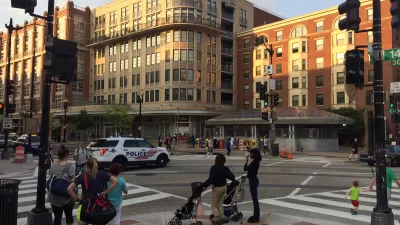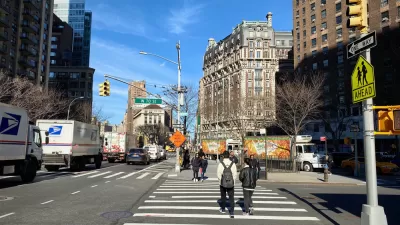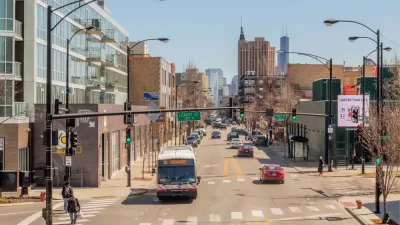Republicans and the American Civil Liberties Union back bills to ban red light and speed cameras in Iowa, while Democrats and law enforcement want to allow cities and counties to retain automated traffic-enforcement tools.

"House Study Bill 512 would void local ordinances authorizing the use of traffic cameras as of July 1 and order their removal in eight cities and one county where they are used," writes James Q. Lynch, political reporter for The Gazette (Cedar Rapids, IA), on Jan. 17.
The use of the cameras may have been well-intentioned, said Daniel Zeno of the ACLU of Iowa, “but we don’t have to give up due process for safety. We can have both."
Opposition to traffic cameras by the American Civil Liberties Union dates back almost 20 years, and is based what they perceive to be a lack of "due process," as Zeno notes.
"There are two issues of fundamental fairness with the cameras that affect the right to due process under the law," according to an ACLU press release dated August 23, 2001.
First, the tickets are sent to the owner of a car, who was not necessarily the person committing the alleged violation. The burden of proof usually then falls on the owner to prove he or she was not driving at the time. This is a violation of the bedrock American principle that the accused be considered innocent until proven guilty.
Second, many red-light camera systems have been installed under contracts that deliver a cut of ticket revenue to the contractor. That creates an obvious incentive to contractors to "game" the system in order to increase revenue...
"Rep. Brian Meyer, D-Des Moines, who was on that city’s council when traffic cameras were installed there, defended their use and said the process for people to contest their citations protects due process," adds Lynch.
“In this bizarro world, Democrats will stand with the police and Republicans are standing with the ACLU,” he said.
It seems like controversy follows traffic cameras, also called automated traffic enforcement. Lynch reports on an ongoing lawsuit and ans Iowa Department of Transportation administrative order that Sioux City, the state's fourth largest city, must deal with to retain its red light and speed cameras. As the ACLU noted above, much opposition stems from the perception that the cameras are more cash cows for local government than legitimate safety tools aiding law enforcement with limited budgets.
HSB 512 was approved by the subcommittee on Wednesday as was a companion bill, Senate Study Bill 3025, over opposition from cities and law enforcement agencies on Thursday, reports Lynch for The Gazette.
“This is an important tool for law enforcement,” lobbyist Gary Grant, representing Cedar Rapids, told the subcommittee. “As we move forward with technology, as law enforcement budgets get tighter and tighter, we need to give them force multipliers when they are out on the street. This is one tool among many law enforcement use to keep our streets safer.
"If HSB 512 is approved, Iowa would be the first state to enact an outright ban on traffic cameras, said David Adelman, representing the Metro Alliance of the 10 largest Iowa cities," adds Lynch.
Hat tip to AASHTO Daily Transportation Update.
FULL STORY: Iowa House panel green-lights bill to ban traffic cameras

Manufactured Crisis: Losing the Nation’s Largest Source of Unsubsidized Affordable Housing
Manufactured housing communities have long been an affordable housing option for millions of people living in the U.S., but that affordability is disappearing rapidly. How did we get here?

Americans May Be Stuck — But Why?
Americans are moving a lot less than they once did, and that is a problem. While Yoni Applebaum, in his highly-publicized article Stuck, gets the reasons badly wrong, it's still important to ask: why are we moving so much less than before?

Research Shows More Roads = More Driving
A national study shows, once again, that increasing road supply induces additional vehicle travel, particularly over the long run.

Advancing Sustainability in Los Angeles County Schools
The Los Angeles County Office of Education’s Green Schools Symposium brings together educators, students, and experts to advance sustainability in schools through innovative design, climate resilience strategies, and collaborative learning.

Using Old Oil and Gas Wells for Green Energy Storage
Penn State researchers have found that repurposing abandoned oil and gas wells for geothermal-assisted compressed-air energy storage can boost efficiency, reduce environmental risks, and support clean energy and job transitions.

How Protecting Kauaʻi’s Forests Safeguards Fresh Water
A University of Hawaiʻi study shows that protecting Kauaʻi’s native forests from invasive species significantly boosts groundwater recharge, making it a cost-effective strategy to secure fresh water and enhance climate resilience.
Urban Design for Planners 1: Software Tools
This six-course series explores essential urban design concepts using open source software and equips planners with the tools they need to participate fully in the urban design process.
Planning for Universal Design
Learn the tools for implementing Universal Design in planning regulations.
City of Moreno Valley
Institute for Housing and Urban Development Studies (IHS)
City of Grandview
Harvard GSD Executive Education
NYU Wagner Graduate School of Public Service
City of Cambridge, Maryland
Newport County Development Council: Connect Greater Newport





























